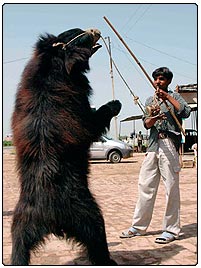India’s Last “Dancing” Bear Set Free
By Sunil Kataria | Дек 26, 2009

RAJU the bear will never have to smoke cigarettes or dance on his hind legs under the hot sun again thanks to a multinational project to save an endangered species and end a cruel centuries-old tradition in India.
Raju was the last endangered sloth bear that had to work for a living, but who now can roam free at the Bannerghatta bear sanctuary on the outskirts of the southern city of Bangalore.
The bear’s freedom is the outcome of lengthy efforts by animal rescue organisations and the Government that have taken the "dancing" bears off India’s streets, where the animals were once as ubiquitous as snake charmers and their cobras.
"This is the very last bear that has been rescued from the roads of India, the actual last one and that is the end of the trade," Mary Hutton, Australia-based chairperson and founder of Free the Bears Fund, said.
Sloth bears are protected under the Convention on International Trade in Endangered Species, but they often entertained crowds by playing imaginary guitars, smoking cigarettes and dancing to the pounding of drums, providing an income for their handlers.
RAJU the bear will never have to smoke cigarettes or dance on his hind legs under the hot sun again thanks to a multinational project to save an endangered species and end a cruel centuries-old tradition in India.
Raju was the last endangered sloth bear that had to work for a living, but who now can roam free at the Bannerghatta bear sanctuary on the outskirts of the southern city of Bangalore.
The bear’s freedom is the outcome of lengthy efforts by animal rescue organisations and the Government that have taken the "dancing" bears off India’s streets, where the animals were once as ubiquitous as snake charmers and their cobras.
"This is the very last bear that has been rescued from the roads of India, the actual last one and that is the end of the trade," Mary Hutton, Australia-based chairperson and founder of Free the Bears Fund, said.
Sloth bears are protected under the Convention on International Trade in Endangered Species, but they often entertained crowds by playing imaginary guitars, smoking cigarettes and dancing to the pounding of drums, providing an income for their handlers.















